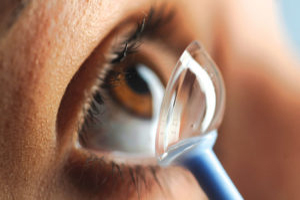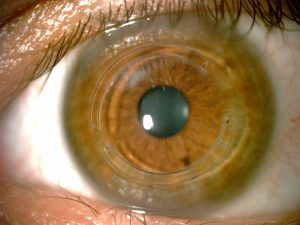Keratoconus
 The cornea is the clear curved layer at the front of the eye. The precise shape of the cornea allows it to act as a lens, projecting an image into the eye. Sometimes the cornea is not strong enough to hold this round shape and it bulges outwards like a cone. This condition is called Keratoconus and it results in significant vision impairment.
The cornea is the clear curved layer at the front of the eye. The precise shape of the cornea allows it to act as a lens, projecting an image into the eye. Sometimes the cornea is not strong enough to hold this round shape and it bulges outwards like a cone. This condition is called Keratoconus and it results in significant vision impairment.
Symptoms usually start to occur in people who are in their late teens and early 20s. The treatment plan for Keratoconus has two aspects, first to stop its progression and second is to look at the refractive error and provide aid to improve the impaired vision. Severe cases may require corneal transplant.
At Gandhi Eye Centrewe offer the latest technology and Dr Parul Sony, with experienced cornea specialists for treatment of Keratoconus.
 The word Keratoconus is formed by two Greek words: kerato, meaning cornea, and konos, meaning cone. Keratoconus is a condition in which the shape of the cornea, which is usually round, is distorted, developing a cone-shaped bulge, resulting in decreased or distorted vision. The condition is mostly bilateral and asymmetric meaning that it usually affects both eyes; however one eye may be more affected than the other. Keratoconus is an inherited condition that sometimes skips generations. Its onset is usually during puberty and is often related to allergies (hay fever, asthma and eczema).
The word Keratoconus is formed by two Greek words: kerato, meaning cornea, and konos, meaning cone. Keratoconus is a condition in which the shape of the cornea, which is usually round, is distorted, developing a cone-shaped bulge, resulting in decreased or distorted vision. The condition is mostly bilateral and asymmetric meaning that it usually affects both eyes; however one eye may be more affected than the other. Keratoconus is an inherited condition that sometimes skips generations. Its onset is usually during puberty and is often related to allergies (hay fever, asthma and eczema). The cornea is a bit more elastic than normal and tends to alter in shape and thins out becoming cone shaped. Rubbing the eyes can aggravate the condition. The typical patient with undiagnosed keratoconus complains of deteriorating vision and frequent change in glasses. They may often report multiple images or ghosting of images and often relate a history of frequent refractive correction changes without much improvement in visual acuity. Patients may also report irritating symptoms such as intolerance to light (glare), photophobia and a recurrent foreign body sensation.
The cornea is a bit more elastic than normal and tends to alter in shape and thins out becoming cone shaped. Rubbing the eyes can aggravate the condition. The typical patient with undiagnosed keratoconus complains of deteriorating vision and frequent change in glasses. They may often report multiple images or ghosting of images and often relate a history of frequent refractive correction changes without much improvement in visual acuity. Patients may also report irritating symptoms such as intolerance to light (glare), photophobia and a recurrent foreign body sensation.
Our centres are equipped with the latest corneal topography systems (Pentacam, Orbscan) to help in early detection and monitoring of keratoconus. Gandhi Eye Centre offers keratoconus treatment and the entire spectrum of treatment modalities Corneal collagen crosslinking, intrastromal ring segments, intraocular collamer lenses (ICL) and corneal transplantation.
